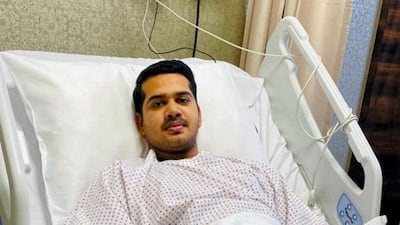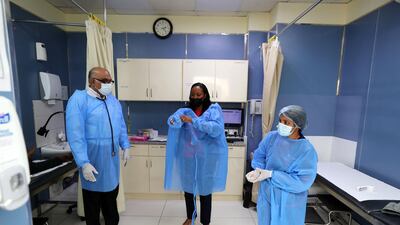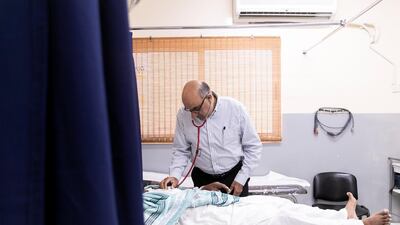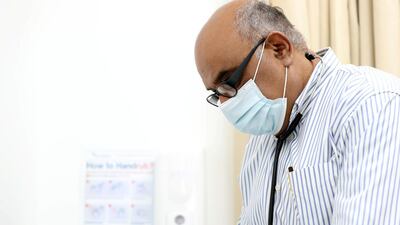Twelve months after the World Health Organisation declared a global pandemic over the spread of Covid-19, a Sharjah resident reveals the physical and mental toll of twice testing positive for Covid-19 in the space of nine months.
Thanseem Parambil, 28, was admitted to Medcare Hospital in Sharjah on February 24 this year, two days after testing positive for Covid-19.
He initially managed the fever at home, in an apartment he shares with friends.
But his temperature started to rise and, reeling with acute body pain, he returned to the hospital's emergency department, where he nearly collapsed and required an intravenous drip.
It came as a shock to Mr Parambil, who previously tested positive for the coronavirus in May last year. He is, however, one of an increasing number of patients in the UAE who are catching Covid-19 for a second time, almost a year after they first caught the virus.
Cases of reinfection are infrequent, doctors say. The symptoms vary from mild to moderate, and are usually handled with isolation and antibiotics, but some patients require hospital treatment.
Dr Sanjay Paithankar, head of the Right Health group, which has 58 clinics in the UAE, said they treat "fewer than 100 patients a week" who have been reinfected with the coronavirus.
They counsel troubled patients and talk to company representatives, who are baffled when told their workers need to be kept in isolation again, having already once recovered from the virus.
Medics are spreading the message that catching Covid-19 does not created a lifetime of immunity and that everyone should continue to take safety precautions.
The World Health Organisation said that although it is rare, research shows that people who were once infected with coronavirus could be infected again when their antibody response wanes.
The US Centre for Disease Control and Prevention said based on its experience with other viruses, Covid-19 reinfections were expected.
‘I could not stand, could not walk’
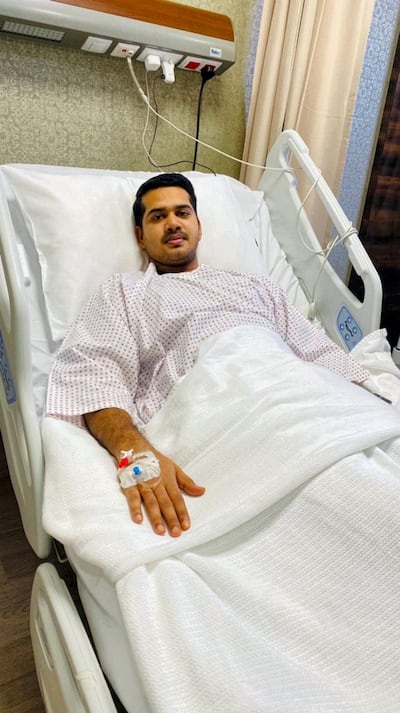
Mr Parambil said the effect was very different the second time around. He experienced mild body aches and recovered from the disease last year after spending a week in quarantine in a hotel.
The Sharjah resident said he feels drained and weakened by the illness this time.
Doctors found bronchial pneumonia patches on his lungs, and administered steroids, anti-inflammation drugs and a blood thinner to control the infection.
"I could not stand, could not walk. I felt dizzy when I stood up. It was horrible because for three days I could not sleep [because of] heavy body pain," said Mr Parambil, who works as a cashier in the same hospital.
“I’m better now but I still feel tired. I was really very upset to get Covid again; this time it was very hard.”
He has a persistent cough that doctors said will ease over time.
He was discharged after a week in hospital and resumed work on Monday after two negative tests.
Mr Parambil was scheduled to take his second dose of the Sinopharm vaccine on the day he was admitted to hospital and will reschedule the dose when he recovers.
He has a safety message that he repeats to anyone he meets.
“People must take this seriously because the second wave is very strong and people need to be more careful now,” he said.
“Some people are still not taking care. I never thought this disease could happen to me twice.”
Dr Rehab Ahmed, a specialist in internal medicine at Medcare Hospital in Sharjah, said this was the first case of reinfection she had treated.
She urged patients not to ignore symptoms.
"Viral infections, especially in Covid, cause inflammation. We start antivirals to stop a cytokine storm. In moderate to severe cases, we give corticosteroids and an anti-coagulant to prevent any deterioration further," she said
“But bronchial pneumonia requires time to fade out, although the infection is treated, bronchial spasms and the residual cough will take some time.”
No lifetime immunity to Covid-19
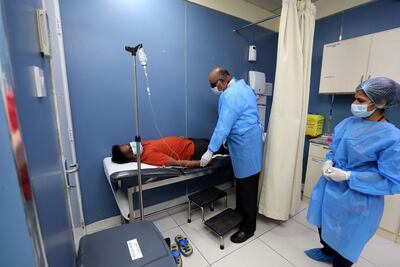
Dr Sanjay Paithankar, who runs 58 low-cost medical facilities across the country, said his doctors are seeing fewer than 100 mild to moderate cases of reinfection a week.
"The symptoms are of longer duration. Last year, we had a lot of people with throat pain, cough, cold and fever who would be OK in three or four days with basic medicines," said Dr Paithankar, head of the Right Health group.
"Now patients are reporting to the clinics with a history of more than two weeks of cough, cold and mild fever. Severe tiredness is an added, new thing, [with] severe muscle, joint pain of a longer duration.
“But the number of reinfections is small; it is fewer than 100 a week across all clinics.”
The men test positive about nine months to a year after they first contracted the virus.
The clinics are within walking distance of labour accommodation and treat 2,500 workers daily.
“The men are upset because they are under the impression they had lifetime immunity,” Dr Paithankar said.
“We have to tell them that a one-time Covid infection does not guarantee you will not be Covid positive the second time.”
In most cases, people were reinfected after the first dose of Sinopharm.
There were fewer cases of reinfection and much milder symptoms after the second vaccination dose, Dr Paithankar said.
The men are administered antibiotics and paracetamol and told to stay in rooms specially designated for quarantine in the labour accommodation buildings.
Dr Paithankar said the workers, who are largely healthy, are recovering quickly.
“The previous exposure to Covid helps your body’s defence mechanism understand there is infection, and it develops antibodies, or soldiers, to protect them,” he said. “The soldiers are ready this time because the enemy is known.”
Medical experts advise everyone to continue to avoid crowded places, socially distance and wear masks.
“All people – those who had Covid, those who took the vaccines and those who have not had Covid – everyone should know that Covid is a part and parcel of your lifestyle,” Dr Paithankar said.

